Kids around Medicine: How Safe Are Kids in Your Home? Take this Quick Quiz to find out.
Do you have young children in your home? Most people know to keep medicine away from kids, but we don’t always think of all the ways curious kids get into them. You may be surprised to learn that in 77% of emergency room visits for medicine poisoning, the child got into medicine belonging to a parent or a grandparent.
Here’s a quick quiz to see how medicine-ready your home is for kids.
-
Question 1: Do you carry medicine in your purse or briefcase?
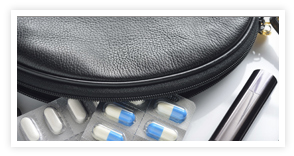 YesNo
YesNoThe small bottle of aspirin we often keep handy in our handbags or briefcases is sometimes overlooked when we think about keeping kids safe around medicine , but check out this surprising statistic: Emergency Room data shows that 20% of medication poisonings are from kids finding medicine in that tempting bag you carry around with you. TIP: If you carry medicine in your bag, be sure to store it where kids can’t get to it.
That’s great. You might be surprised to hear how often kids get into medicine they find in a purse, bag or briefcase. Emergency Room data shows that 20% of medication poisonings are from kids finding medicine in a purse or bag.
-
Question 2: Do you keep medicine on your nightstand?
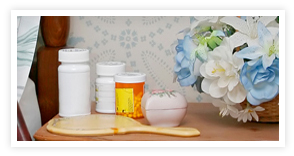 YesNo
YesNoTake a look at the products stored in your nightstand. Many people keep sleeping pills or pain relievers by their bed. And we often don’t think of ointments and eye drops as medicines, but they are, and can cause harm if a child swallows them. TIP: Check your nightstand and bathroom drawers to make sure there isn’t anything accessible that can harm kids.
Very wise. Nightstands are easy for most kids to get into, so you are smart to keep bedside furniture clear of medicine. Many people don’t think of products like ointments and eye drops as medicines, but they are, and can cause harm if a child swallows them.
-
Question 3: Do you keep vitamins on your counter?
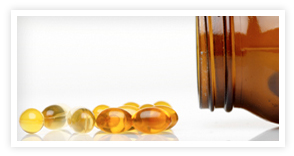 YesNo
YesNoMost of us don’t think of vitamins as medicine, but for a little body, they can be dangerous. TIP: Keep all medicine, including vitamins, up and away and out of sight.
That’s a smart practice. Most of us don’t think of vitamins as medicine, but for a little body, they can be dangerous. It’s wise to keep all medicine, including vitamins, up and away and out of sight.
-
Question 4: Do you keep your medicines out where you see them regularly, to help you remember to take them?
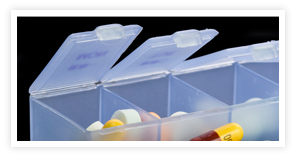 YesNo
YesNoIt’s tempting to leave medicines out where you can see them to remind you to take them. But that often means they are also visible to kids. TIP: Leave a note for yourself in a place where you can’t fail to see it.
Great answer! It’s always best to keep medicine up and away and out of sight of children.
-
Question 5: Do you use child-resistant caps?
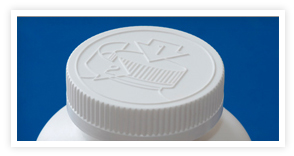 YesNo
YesNoThat’s great. Medicines with child resistant caps are a better choice in homes where kids visit or live. But child-resistant doesn’t mean child-proof, so either way, it’s best to keep all medicine out of sight and out of reach.
Child-resistant caps are more challenging to open and might not be the right choice for everyone. But you can still protect kids by keeping all medicine out of sight and out of reach.
-
Question 6: Do you know the Poison Help Number or have it handy?
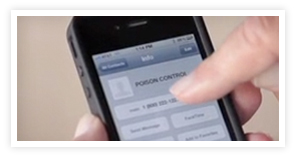 YesNo
YesNo1-800-222-1222, right? Congratulations! It’s an important number to know. You may have it stored in your cell phone, but consider also posting it in your home where caregivers can easily see it. And remember, the Poison Help Number is not just for emergencies, you can always call with questions about how to take or give medicines.
TIP: It’s important to store the Poison Help Number in your home and cell phone and post it in your home where caregivers can find it easily. 1-800-222-1222. And remember, the Poison Help Number is not just for emergencies, you can always call with questions about how to take or give medicines.